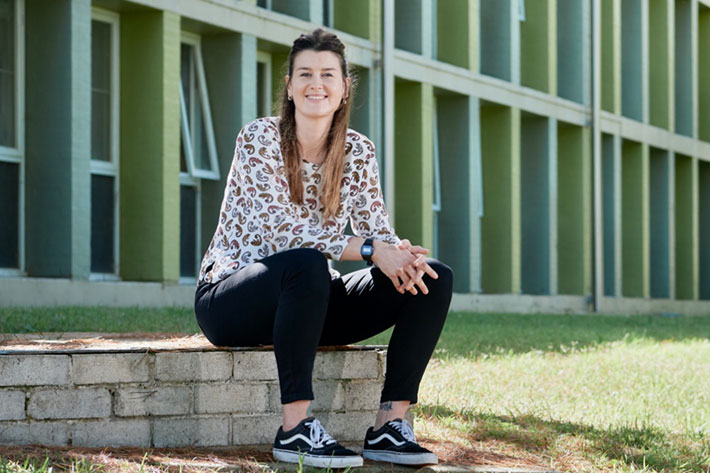A link that spans 82 years of UNE history was made this week between the founder of geosciences at the University and one of its new rising stars.
Dr Marissa Betts, a palaeontologist and geologist with UNE's Palaeoscience Research Centre, was awarded the A.H. Voisey Medal by the Geological Society of Australia (NSW Division).
The award recognises earth scientists who have made a significant contribution to the field despite having only completed their PhD in the past five years.
The medal is named for Alan Heywood Voisey (1911-1995), who was appointed Lecturer-in-Charge of Geology and Geography at New England University College (the precursor to UNE) in 1939, and who became Foundation Professor of Geology at UNE in 1954.
"UNE has a long history of outstanding geoscience and palaeoscience, disciplines that were established here by A.H. Voisey, so it is a great honour to receive this award," Dr Betts said.
"It also helps shine some light on the amazing research group we have here at UNE."
Dr Betts's work focuses on the interval of time called the early Cambrian (542-509 million years ago), when most of the major animal groups appeared.
Much of her field work has been conducted in the Flinders Ranges in South Australia, which have some of the best Cambrian deposits in the world.
Her major contribution to the field has been to refine the Australian part of the early Cambrian geological timescale to better understand the age of the Cambrian rocks in Australia and the timing of important evolutionary events happening at that time.
"The global significance of fossils in the Flinders Ranges is a key reason why this area is currently being nominated as a UNESCO World Heritage Site. My work supports the scientific side of this nomination, drawing together an archive of palaeontological and geological data about the Cambrian prehistory of the Flinders Ranges."
The award also reflects some of Dr Betts's outreach work in support of women in STEM (Science Technology Engineering Mathematics). She is a “STEM Coach” for Curious Minds Australia, a program that pairs high school girls with a mentor to foster their interest in STEM fields; and was one of 60 scientists recently selected to participate in the 2021-2022 Superstars of STEM program. This professional development program for women in STEM is intended to increase the visibility of women as experts, and reset society’s gender assumptions about who can work in STEM.
"I became a palaeontologist because I loved studying geology at uni," Dr Betts said.
"Rocks can tell amazing stories about what the Earth was like in the past. Layering fossils on top paints a fuller picture of how our planet and its inhabitants have evolved."
"My favourite part of the job is fieldwork, I love getting out and finding fossils and understanding more about the rocks they occur in – this is probably the geologist in me! Also getting out in nature is good for the soul I think."
Dr Betts's love of the geosciences is partly driven by the colleagues she works with in the field. She credits Professor Glenn Brock at Macquarie University and Professor John Paterson, who leads UNE's Palaeoscience Research Centre, as important mentors and influences.
"Making a connection with people in the discipline is key for anyone keen to get into palaeontology or the earth sciences in general," she said.
"I felt like I had found my home when I met other palaeo students and researchers, and their support has really helped me go the distance. The geoscience and palaeoscience group here at UNE really feels like a big family. Anyone who loves learning about the Earth is welcome to hang with us any time!
The work done by the extended geosciences family carries through the generations.
A.H. Voisey made significant contributions to the understanding of geology in the New England region, especially in the area of geological mapping. Voisey's seminal work on the tectonic evolution of eastern Australia underpins major research themes of current UNE geoscientists like Dr Luke Milan and Dr Tim Chapman who, with Dr Betts, have recently established the geoscientific research group LithoLab UNE (@litholab_une on Twitter and Instagram).


